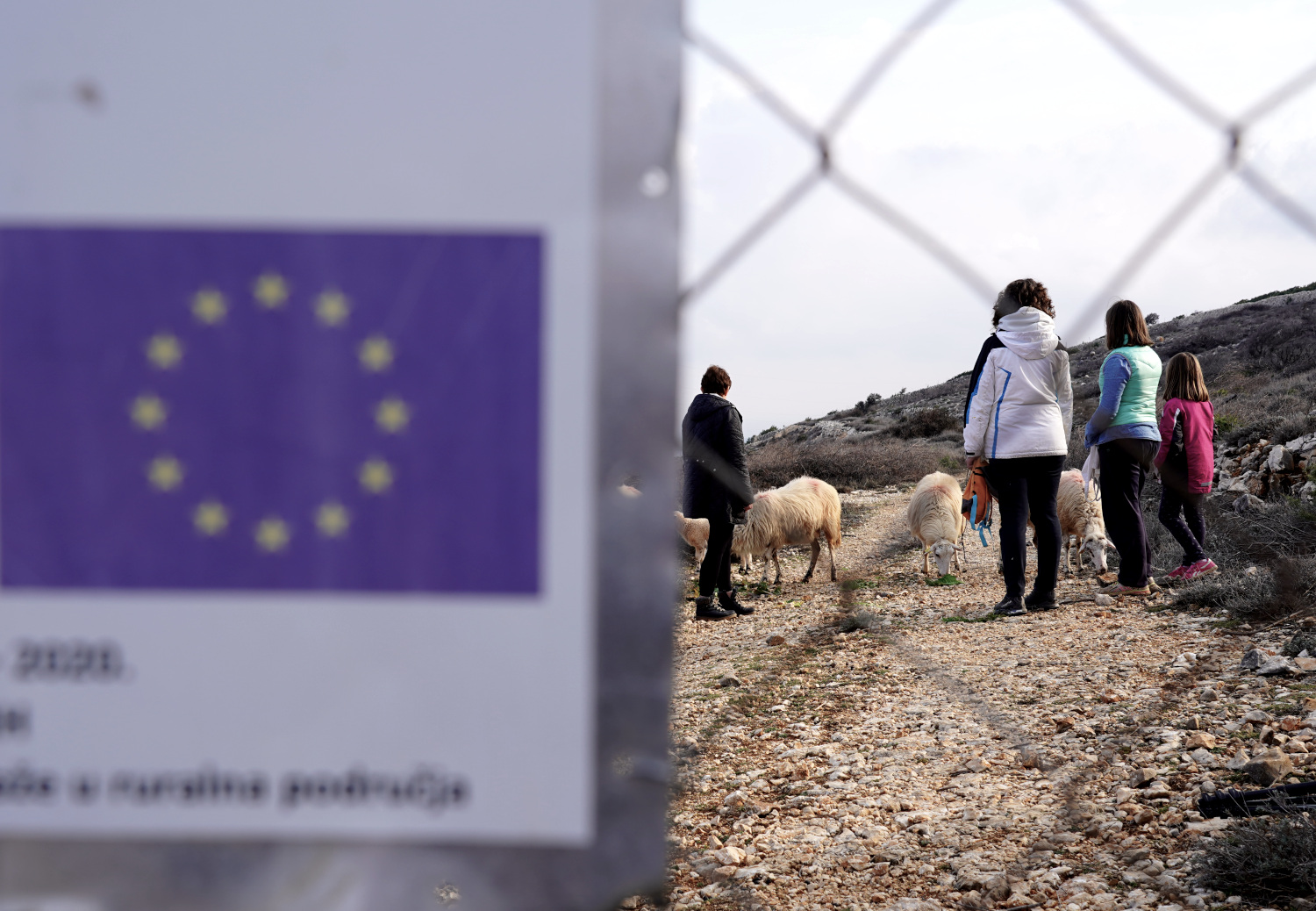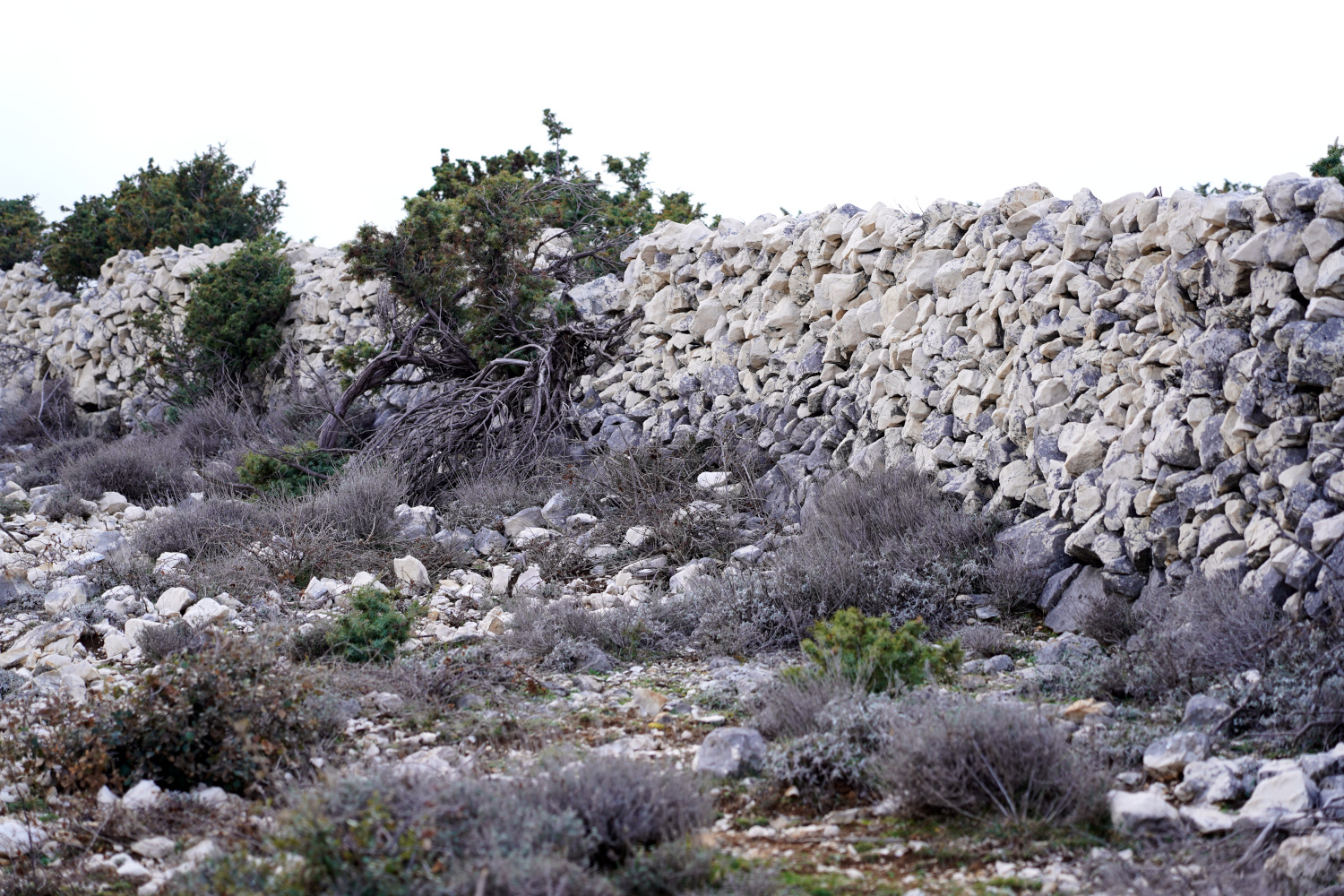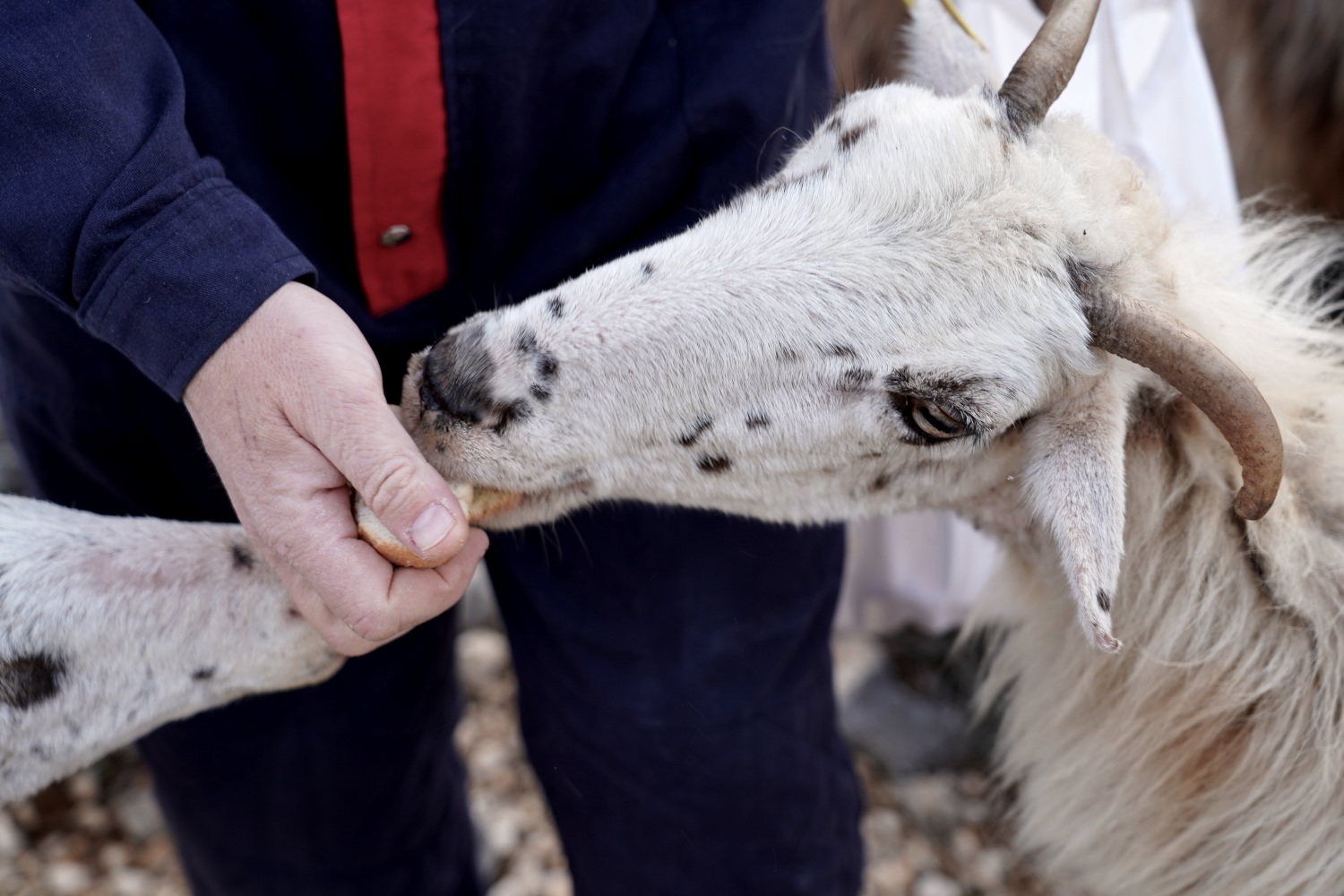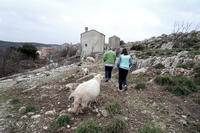Cres, the sheep, Europe
Local official in the morning, farmer in the afternoon. Franjo Toic is the emblem of what Europe can be: local, global, with a strong civic and community sense. An encounter
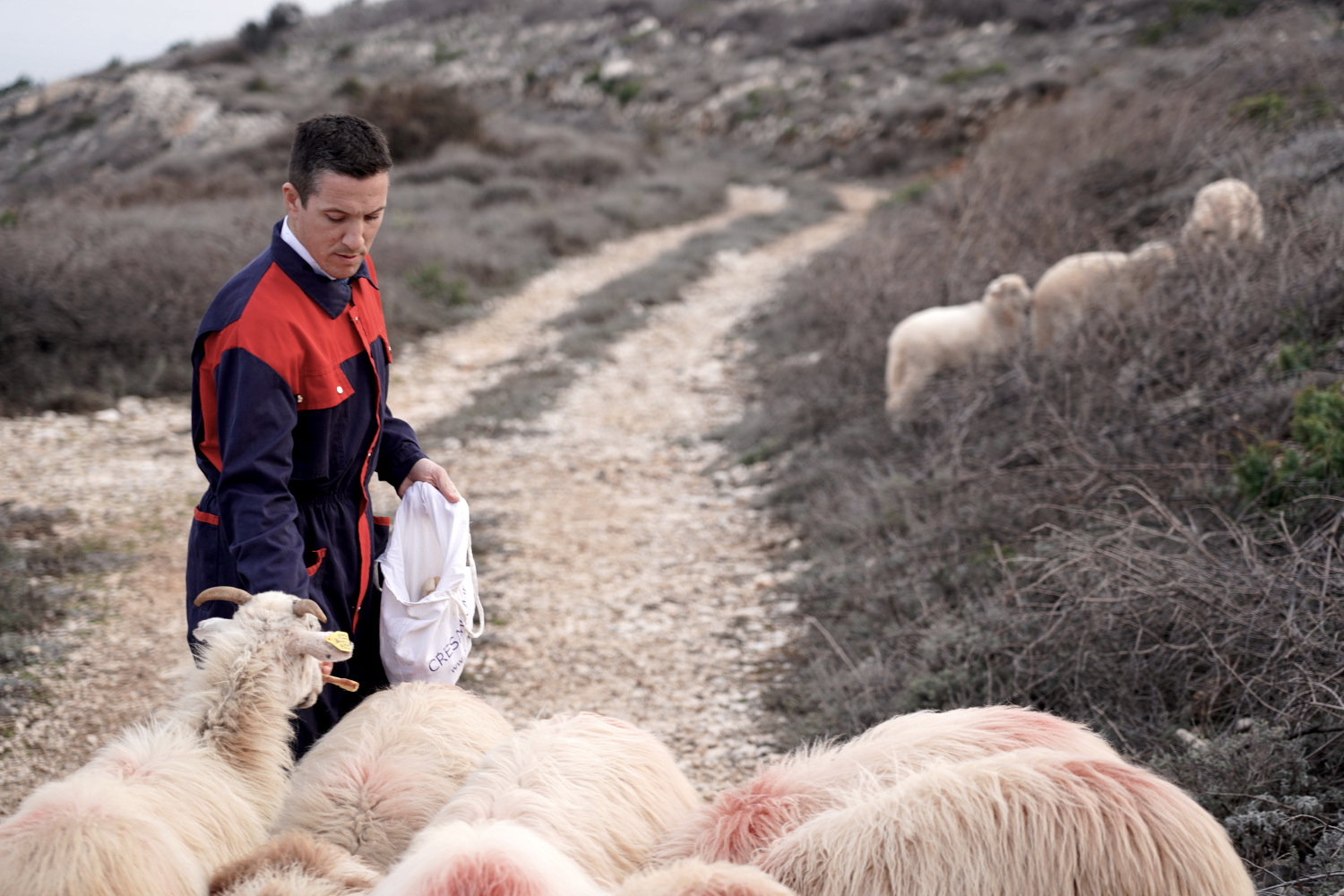
Cherso-le-pecore-l-Europa
Franjo Toic - photo by Davide Sighele
They drive there first – Franjo’s wife Giovanna, his sister Izidora, and two nieces, Veronika and Rebeka. “Franjo is coming, we’ll take you to our land, where the sheep are”, says Giovanna. We were waiting for them at the edge of a dirt road on a plateau between Lake Vrana and Ossero, where a small self-propelled bridge crosses the artificial channel that separates the island of Cres from that of Losinj.
The colours are brown, due to the season and the little rain. In the skies of this part of the island, not seagulls but griffon vultures. The dry stone walls contain explosions of juniper and rosemary.
"The ground on both sides of the island is generally mountainous, and strewn with stones. (…) The most extensive of these deserts is a flat peak of mountains, which stretches for five miles from Orletz to beyond Vrana along the road, which leads to Osero. The inhabitants call those places Arabia Petrea. However, they provide an excellent pasture to the sheep, which go between stone and stone, gathering the minute weeds and fragrant herbs, for which pasture they become extremely fat, and they give the best milk that could be desired; hence the giuncata, the ricottas, and all similar foods are exquisite in Cres", Alberto Fortis, 1771
We get back into the car and follow them slowly, the road surface is bumpy. The dirt road is a straight line, interrupted by a regular succession of gates. Veronika promptly gets out of the car, opens the gate, waits for us to pass, and diligently closes it again. Each piece of land, a few hectares, is surrounded by dry stone walls, here called gromace and, where these are missing, metal mesh. They enclose the pasture for sheep, traditional breeding, a visible and constant presence throughout the island in these winter months.
“In the summer, you see them less during the day. They take shelter in the shade”, Izidora tells us once we arrive at the family property, while the girls distribute pieces of dry bread, brought with them in plastic bags. “We gave them this habit – continues Izidora – to ensure that when we arrive they come to us. So, if needed, we can milk them easily”. In fact, on the island the sheep are raised in the wild throughout the year, moved regularly from one area to another to allow the pastures to regenerate. Hence the extraordinary quality of Cres lamb, its real gastronomic "brand". It is the persistence of this ancient breeding technique that has allowed the griffon, an endangered species that feeds exclusively on animal carrion, to survive.
Franjo arrives. His first gestures show the essence of his life. He gets out of the car and Giovanna helps him put on a full overalls, to cover the trousers, sweater, and shirt. Then he changes shoes. He has just finished his day as an official of the municipality of Mali Losinj and now, in the mid-afternoon, he begins to take care of the flock and the other traditional agricultural activities of his family: olive trees and beekeeping.
He is 35 years old and has a strong attachment to the island and its landscapes. “I studied outside the island, I travel often, but this is where I want to live”. “What do I like best about sheep? After a few hours I look back and see so many things done and detach from all those Excel sheets I work on the rest of the day".
In 2018, Franjo participated in a tender launched by LAG "Kvarnerski otoci" (Local Action Group- LEADER/CLLD programme), thanks to the fund from European fund for rural development, to support young farmers. “I wrote a project and obtained a loan that allowed me to fence three of my properties with electric wire and to uproot the junipers”. He did it to protect his sheep from wild boars, an alien species and a real plague on the island. “Unfortunately they reproduced uncontrollably. They were introduced to be hunted, it’s a business, hunters from the mainland and abroad come here and are ready to pay thousands of Euros for a nice trophy". But, in times of food shortage, the wild boars attack and feed on the lambs, also destroying other local fauna. “Since 2010 we breeders have gathered in a hunting association to contain wild boars and deers. But it is a difficult situation and it is often those who make money accompanying hunters who come from outside who are responsible for the spread of wild boar. It is a double-edged sword, politics has brought wild boars to the island and only politics can find a solution".
Franjo is also considering writing an Interreg project with Italian partners to fund a study on the problem. And then go from there to solve it. In Mali Losinj he deals with European project writing. "Shortly after participating in the tender for young farmers, I was offered a municipality job precisely to deal with European projects – says Franjo – on the two islands, Cres and Losinj, we are small municipalities but we are structuring ourselves to be able to take advantage of the development opportunities that come from Europe”.
Franjo turns to Giovanna, smiles at her, both look at the two granddaughters with the recently born lambs in their arms. They live their community intensely. “We live in a small town, Loznati, in the hinterland of the island. Few families. And it is perhaps for this reason that it is more natural for us to think in collective terms, perhaps more than those who live in the city".
Tourism is a great resource and at the same time a danger for the island. “Directly or indirectly we all live from tourism, and it is a great fortune. But often I submit projects and new opportunities and I hear the answer: ‘But why bother so much, the rents of our apartments are enough for us’. To tell the truth, something has changed with the pandemic, some of my peers have seen what happens if the tourist flow is interrupted, some certainties have crumbled and people have started, for example, to recover their grandparents’ olive trees". "Fortunately, as our elders remember – adds Izidora – the vine dies if not taken care of, but the olive trees instead know how to wait".
As we are about to finish our chat, some sheep approach us, as if they had understood that Franjo’s attention would soon turn to them. Each has a name. “That’s Flora, she belonged to my grandmother. She could no longer keep her, because she was too old, she wanted to slaughter her. We were at her place for dinner and we picked her up, taking her back to the island by car and ferry. Now grandma has sadly passed away. Flora is pregnant, she will give birth soon”, says Giovanna with sincere tenderness.
It is to a new and ongoing sense of community that Franjo’s hopes for the future are directed. “It is necessary to establish an awareness of sustainability for the territory, starting from education in schools, with children. And that those involved in tourism are also involved. Here, for example, despite the Vrana Lake, we have a constant shortage of water. We are used to turning off the taps, but tourists in multi-star hotels should do the same”. A conscience that in Cres will hopefully have the tenacity of the juniper, although here it is a symbol of the abandonment of pastures and fields. Hence Franjo’s other wish, which he confides to us before starting his daily work with the sheep. “The juniper creates the ideal environment for the wild boar which does not like open spaces, prevents the growth of the grass, and then its thorns get entangled in the sheep’s fleece, often making the wool unusable”, says Franjo, “and I would like for the other properties around here to be taken over by young people like me, for us to get together to cut junipers".
A new community to be shared also with guests: “I hope to be able to continue working with sheep, olive trees, and beekeeping for a long time. And then I’d like to be able to open a farm. There are so many people that have never even touched the sheep. I have worked with tourists for years and for many of them this is a paradise. They come from France and England and are amazed by the butterflies. It would therefore be wonderful to let them discover our traditional activities. After all, if they say we are in a paradise, it is true, isn’t it?”.
*Nicole Corritore contributed to the creation of this report
Lubenizze
Lubenice is a landing place of ordered stones in a rippled karst landscape, overlooking on one side a cliff and the sea, on the other a forest of downy oaks, oaks, and holm oaks with some cultivated terraces. At the edge of the village, slightly away from the houses, is a small church with its own cemetery. There Veronika observes the fields and pastures below through binoculars. “Here they are, over there, there are two of them”. A few brown patches move slowly across a darkened pasture. “They are probably females, somewhere there are also the little ones. Now I’m going to tell grandma that they are here". They are wild boars, a plague on the island: they compete with the sheep for grass, but not only. Even the little lambs eat it and devastate the fields, with their muzzles, in search of acorns and roots. Their presence is also apparent in the gardens adjacent to the houses, in the heart of the town, with the land appearing to have been roughly plowed.
This content is published in the context of the “Work4Future” project co-financed by the European Union (EU). The EU is in no way responsible for the information or views expressed within the framework of the project. The responsibility for the contents lies solely with OBC Transeuropa. Go to the “Work4Future“
Tag: Work for Future
Featured articles
- Take part in the survey
Cres, the sheep, Europe
Local official in the morning, farmer in the afternoon. Franjo Toic is the emblem of what Europe can be: local, global, with a strong civic and community sense. An encounter

Cherso-le-pecore-l-Europa
Franjo Toic - photo by Davide Sighele
They drive there first – Franjo’s wife Giovanna, his sister Izidora, and two nieces, Veronika and Rebeka. “Franjo is coming, we’ll take you to our land, where the sheep are”, says Giovanna. We were waiting for them at the edge of a dirt road on a plateau between Lake Vrana and Ossero, where a small self-propelled bridge crosses the artificial channel that separates the island of Cres from that of Losinj.
The colours are brown, due to the season and the little rain. In the skies of this part of the island, not seagulls but griffon vultures. The dry stone walls contain explosions of juniper and rosemary.
"The ground on both sides of the island is generally mountainous, and strewn with stones. (…) The most extensive of these deserts is a flat peak of mountains, which stretches for five miles from Orletz to beyond Vrana along the road, which leads to Osero. The inhabitants call those places Arabia Petrea. However, they provide an excellent pasture to the sheep, which go between stone and stone, gathering the minute weeds and fragrant herbs, for which pasture they become extremely fat, and they give the best milk that could be desired; hence the giuncata, the ricottas, and all similar foods are exquisite in Cres", Alberto Fortis, 1771
We get back into the car and follow them slowly, the road surface is bumpy. The dirt road is a straight line, interrupted by a regular succession of gates. Veronika promptly gets out of the car, opens the gate, waits for us to pass, and diligently closes it again. Each piece of land, a few hectares, is surrounded by dry stone walls, here called gromace and, where these are missing, metal mesh. They enclose the pasture for sheep, traditional breeding, a visible and constant presence throughout the island in these winter months.
“In the summer, you see them less during the day. They take shelter in the shade”, Izidora tells us once we arrive at the family property, while the girls distribute pieces of dry bread, brought with them in plastic bags. “We gave them this habit – continues Izidora – to ensure that when we arrive they come to us. So, if needed, we can milk them easily”. In fact, on the island the sheep are raised in the wild throughout the year, moved regularly from one area to another to allow the pastures to regenerate. Hence the extraordinary quality of Cres lamb, its real gastronomic "brand". It is the persistence of this ancient breeding technique that has allowed the griffon, an endangered species that feeds exclusively on animal carrion, to survive.
Franjo arrives. His first gestures show the essence of his life. He gets out of the car and Giovanna helps him put on a full overalls, to cover the trousers, sweater, and shirt. Then he changes shoes. He has just finished his day as an official of the municipality of Mali Losinj and now, in the mid-afternoon, he begins to take care of the flock and the other traditional agricultural activities of his family: olive trees and beekeeping.
He is 35 years old and has a strong attachment to the island and its landscapes. “I studied outside the island, I travel often, but this is where I want to live”. “What do I like best about sheep? After a few hours I look back and see so many things done and detach from all those Excel sheets I work on the rest of the day".
In 2018, Franjo participated in a tender launched by LAG "Kvarnerski otoci" (Local Action Group- LEADER/CLLD programme), thanks to the fund from European fund for rural development, to support young farmers. “I wrote a project and obtained a loan that allowed me to fence three of my properties with electric wire and to uproot the junipers”. He did it to protect his sheep from wild boars, an alien species and a real plague on the island. “Unfortunately they reproduced uncontrollably. They were introduced to be hunted, it’s a business, hunters from the mainland and abroad come here and are ready to pay thousands of Euros for a nice trophy". But, in times of food shortage, the wild boars attack and feed on the lambs, also destroying other local fauna. “Since 2010 we breeders have gathered in a hunting association to contain wild boars and deers. But it is a difficult situation and it is often those who make money accompanying hunters who come from outside who are responsible for the spread of wild boar. It is a double-edged sword, politics has brought wild boars to the island and only politics can find a solution".
Franjo is also considering writing an Interreg project with Italian partners to fund a study on the problem. And then go from there to solve it. In Mali Losinj he deals with European project writing. "Shortly after participating in the tender for young farmers, I was offered a municipality job precisely to deal with European projects – says Franjo – on the two islands, Cres and Losinj, we are small municipalities but we are structuring ourselves to be able to take advantage of the development opportunities that come from Europe”.
Franjo turns to Giovanna, smiles at her, both look at the two granddaughters with the recently born lambs in their arms. They live their community intensely. “We live in a small town, Loznati, in the hinterland of the island. Few families. And it is perhaps for this reason that it is more natural for us to think in collective terms, perhaps more than those who live in the city".
Tourism is a great resource and at the same time a danger for the island. “Directly or indirectly we all live from tourism, and it is a great fortune. But often I submit projects and new opportunities and I hear the answer: ‘But why bother so much, the rents of our apartments are enough for us’. To tell the truth, something has changed with the pandemic, some of my peers have seen what happens if the tourist flow is interrupted, some certainties have crumbled and people have started, for example, to recover their grandparents’ olive trees". "Fortunately, as our elders remember – adds Izidora – the vine dies if not taken care of, but the olive trees instead know how to wait".
As we are about to finish our chat, some sheep approach us, as if they had understood that Franjo’s attention would soon turn to them. Each has a name. “That’s Flora, she belonged to my grandmother. She could no longer keep her, because she was too old, she wanted to slaughter her. We were at her place for dinner and we picked her up, taking her back to the island by car and ferry. Now grandma has sadly passed away. Flora is pregnant, she will give birth soon”, says Giovanna with sincere tenderness.
It is to a new and ongoing sense of community that Franjo’s hopes for the future are directed. “It is necessary to establish an awareness of sustainability for the territory, starting from education in schools, with children. And that those involved in tourism are also involved. Here, for example, despite the Vrana Lake, we have a constant shortage of water. We are used to turning off the taps, but tourists in multi-star hotels should do the same”. A conscience that in Cres will hopefully have the tenacity of the juniper, although here it is a symbol of the abandonment of pastures and fields. Hence Franjo’s other wish, which he confides to us before starting his daily work with the sheep. “The juniper creates the ideal environment for the wild boar which does not like open spaces, prevents the growth of the grass, and then its thorns get entangled in the sheep’s fleece, often making the wool unusable”, says Franjo, “and I would like for the other properties around here to be taken over by young people like me, for us to get together to cut junipers".
A new community to be shared also with guests: “I hope to be able to continue working with sheep, olive trees, and beekeeping for a long time. And then I’d like to be able to open a farm. There are so many people that have never even touched the sheep. I have worked with tourists for years and for many of them this is a paradise. They come from France and England and are amazed by the butterflies. It would therefore be wonderful to let them discover our traditional activities. After all, if they say we are in a paradise, it is true, isn’t it?”.
*Nicole Corritore contributed to the creation of this report
Lubenizze
Lubenice is a landing place of ordered stones in a rippled karst landscape, overlooking on one side a cliff and the sea, on the other a forest of downy oaks, oaks, and holm oaks with some cultivated terraces. At the edge of the village, slightly away from the houses, is a small church with its own cemetery. There Veronika observes the fields and pastures below through binoculars. “Here they are, over there, there are two of them”. A few brown patches move slowly across a darkened pasture. “They are probably females, somewhere there are also the little ones. Now I’m going to tell grandma that they are here". They are wild boars, a plague on the island: they compete with the sheep for grass, but not only. Even the little lambs eat it and devastate the fields, with their muzzles, in search of acorns and roots. Their presence is also apparent in the gardens adjacent to the houses, in the heart of the town, with the land appearing to have been roughly plowed.
This content is published in the context of the “Work4Future” project co-financed by the European Union (EU). The EU is in no way responsible for the information or views expressed within the framework of the project. The responsibility for the contents lies solely with OBC Transeuropa. Go to the “Work4Future“
Tag: Work for Future

